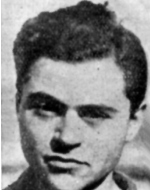Parker, Simcha (Simchala)
Son of Esther and Jacob, was born on the 27th of Tishrei 5724 (27.9.1923) in Germany. He attended the Jewish elementary school in Essen and joined a Zionist youth movement. In 1938, when the Jews of Poland were expelled from Germany, he returned with his parents to their country of origin, Poland, and joined a training group. At the outbreak of the Second World War he moved to Vilna and in February 1941 immigrated to Eretz Israel as part of the Youth Aliya. He studied at the Mikveh Israel Agricultural School and studied agricultural machinery and tractors. In March 1943 he joined the Hamdiya group. At first he worked in outdoor jobs and as the group began to settle, he began to work in the field. In 1945 he moved with the group’s nucleus to Heftz-Be and was a member of the kibbutz. Here too he worked in the field and was a diligent and loyal worker. He devoted himself to his work and to the agriculture, was aware of problems, criticized, but was able to respect company decisions. After his family was exterminated by the Nazis, he felt lonely. He withdrew from social life and did not try to make friends with him, but his friends understood for himself. From the day he immigrated to Israel he was a member of the Hagana. When the War of Independence broke out he took part in battles in Tirat Zvi and Mishmar HaEmek in the framework of the Nahal Hahayal, serving in one of the Golani Brigade battalions since his founding and took part in all the battalion’s activities in the valley, Galilee and Negev. But he refused, because he did not want to command others. The new orders on the regime and the army also damaged his modest character. In Operation Horev, the expulsion of the Egyptian army from Israel, the Golani Brigade was tasked with creating a deception in the western wing of the front, before the main effort in the eastern wing began. On the night of December 22-23, 1948, the brigade captured the 86th position north of Khan Yunis, threatening the road and the railway, and gave the impression that the intention was to cut off the Egyptian forces in the Gaza Strip. The Egyptians reacted with a fierce counter-attack with the help of artillery and armor, and under enemy pressure the Golani fighters were forced to retreat. During the withdrawal from the outpost, Simha was hit by a mortar shell and died on the spot on December 23, 1948. With whom his commander fell. His memory was included in the booklet “In Memory of the Four” issued by the Heftzi-Ba group. On the day of the 30th of Shevat 5709 (March 1, 1949), he was brought to eternal rest in the cemetery at Heftzi-Baha.
